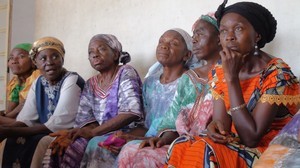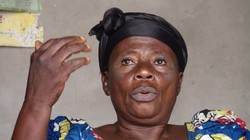“My husband died at the Congo border. When I received word about his death, I dropped what I was doing and traveled there. But upon my return home two weeks later, I found that my in-laws had taken all that my husband had left me. I was stripped of everything; we didn’t have even a stool to sit on. They started to harass me and wanted to chase me out of our house but thanks to mediation efforts by the church, I was allowed to stay and raise my children.”
View a short video of testimonies by Congolese widows about their experiences with this cultural phenomenon.
Last November, I heard one widow after the other share about her ordeal. I was back in the Congo for the first time in fifteen years to discern with Jeff (Boyd) the question our Presbyterian World Mission colleagues had brought before us: Would we consider relocating to this country from which we had evacuated twice with our three young children?
The widows’ stories resonate with those I've heard from African sisters across the continent. The Rev. Christine Ngalula, the assistant director of the Department for Women and Families of the Presbyterian Community in the Congo (CPC), elaborates:

Congo widows tell their stories to the Department for Women and Families of the Presbyterian Community in the Congo. —Christi Boyd
“This form of cultural violence is part of the widowhood rites. When a husband dies, the wife has to suffer. People will accuse her of having caused her husband's death. Then his family confiscates all property and evicts the wife and her children under the pretext that they are witches.”
In an avalanche of unstoppable fervor, Ngalula continues for the next hour, describing how she draws on experiences from Tumekutana, a solidarity platform organized by, and for, women leaders from the PC(USA) partner churches in sub-Saharan Africa. Co-sponsored by Presbyterians in the U.S., the 2007 gathering had inspired and empowered the CPC women to take on this deeply-rooted cultural phenomenon:
Upon our return from Tumekutana, we started visiting remote grassroots communities and observed that women suffer the burden of customary practices. They are retrograde customs that annihilate women’s rights and weaken them.
We wrote a project proposal and sent it to Presbyterian Women in the U.S. under the title “Promotion of Women’s Rights.”
We launched this program to make women aware of their rights, to let them know that after their [traditional] wedding, they should register their marriage. If they have their marriage certificates and the children have their birth certificates, there is no customary practice, in fact, nothing is above the law. Family members can even be arrested in the case of abuse.
Christine holds up a picture:
“This here was a seminar to train the trainers. Then, those we train have to repeat the same in their own setting. We identified the participants, three-fourths of them women and one-fourth, men: traditional chiefs, pastors, territorial administrators, women leaders of the church and other village women. We do Bible study about women's and children's rights to highlight acts of violence narrated in the Old Testament, and also integrate women’s and children’s rights in our Sunday School program.”
Deploring the way men use their wives as production machines for their own financial gain, she struggles for words to express her indignation: "That ... that goes against the law, and against God's will!" (View a nine-minute video of Christine passionately telling this story.)
Rev. Ngalula's words bring to mind Isaiah 1:17 ― “Learn to do good; seek justice, correct oppression; bring justice to the fatherless, plead the widow's cause” (NIV).
Scripture reminds us how, throughout the ages and across cultures, widows and their children have typically been pushed to the margins of society, but in God's household, they have been embraced with prophetic compassion.
Likewise, and in discernment with partners stateside and worldwide, Presbyterian World Mission has placed the well being of vulnerable women and children at the heart of its global ministries. This policy has been made evident in the development of two facilitator positions for the interests of women and children in Africa.
Thus, while Jeff and I are making Kinshasa our new home for the time to come, I am preparing to accompany church partners such as Rev. Ngalula in the Congo, Niger, Rwanda, Madagascar and South Sudan in initiatives where women's and children's concerns intersect with World Mission’s three Critical Global Initiatives (CGI) of Poverty Alleviation, Reconciliation in Cultures of Violence (including our own) and Evangelism.
In societies, where destitution drives families to cast out the vulnerable, and prolonged civil strife corrupts the conscience of warring men, women and children are indeed at risk ― but also in affluent civilizations like the U.S., where the social fabric is disintegrating, and systemic inequalities lead to their abuse and exploitation.
At last year’s Big Tent in August, a denomination-wide campaign was launched to stop gender based violence, with Shannon Beck as World Mission's reconciliation catalyst to help move along the processes to inspire, equip and connect Presbyterian constituencies in synergy with global partners and mission co-workers. Stay tuned to join in!
Indeed, we affirm and celebrate our connectedness and interdependence in mutuality through Presbyterian World Mission towards the fulfillment of God’s global mission. Jeff and I cannot fulfill our new assignment without the many and diverse expressions of support we receive. Your continued prayers raise our spirit; your words of encouragement strengthen our hearts; by the grace of God, your acts of kindness, compassion and solidarity further our joint ministries with global partners; and your generosity towards our missionary support account helps the PC(USA) cover the inevitable costs of preparing, sending and sustaining Jeff and me as its mission workers in Africa.
All are invited to prayerfully consider their part of this collective endeavor and pass on the word!

